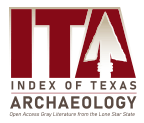Home > Research Projects and Centers > Center for Regional Heritage Research > Index of Texas Archaeology > Vol.
Agency
Texas Historical Commission
Abstract
Collin College has proposed the Allen Campus project where campus facilities will be constructed in northwest Allen, Collin County, Texas. Collin College retained Terracon Consultants, Inc. to conduct a systematic, intensive pedestrian survey of the approximately 32-acre project area. Because Collin College, a political subdivision of the State of Texas, sponsored the project, the proposed undertaking is subject to compliance with the Antiquities Code of Texas and oversight from the Texas Historical Commission. In addition, the survey meets the standards for compliance under Section 106 of the National Historic Preservation Act of 1966, as amended, should a US Army Corps of Engineers permit be required for the project. The cultural resources survey was carried out under Texas Antiquities Permit Number 8130, issued to Ann M. Scott, PhD, RPA, Principal Investigator. Fieldwork was carried out by Dr. Scott, with assistance from Project Geoarcheologist David Yelacic, MS, Project Archeologist Caitlin Gulihur, MA, and Archeological Technician Juan Morlock. Records from the project will be curated at the Center for Archaeological Studies at Texas State University.
The 32-acre project area was considered the Area of Potential Effect (APE). Survey of the APE consisted of systematic pedestrian coverage, including discretionary shovel tests. The work was carried out on August 21-22, 2017. Fourteen shovel tests were excavated in areas that had less than 30 percent ground visibility or placed in areas previously undisturbed. No artifacts were discovered during the excavation of the shovel tests. In addition, six backhoe trenches were excavated in areas with high potential for buried cultural deposits. No cultural materials were observed during the course of backhoe trenching. As a result of the survey, two historic-age sites were recorded, 41COL300 and 41COL301. Site 41COL300 consisted of a historic-age trash midden. Artifacts included metal fragments, tires, and plastic and glass containers; several items, such as children’s toys were from the 1960s and 1970s. Little potential for buried deposits was noted when the site was recorded. Within the current project APE, site 41COL301 consisted of four outbuildings. A collapsed house structure and at least one more outbuilding are located outside of the current project APE. These structures had been noted on historic aerials and topographic maps. No buried deposits were noted at the site. Neither site appears to maintain integrity and substantive research value. Deed and historic research did not link the sites to significant events or individuals. Neither site is recommended as eligible for listing on the National Register of Historic Places (NRHP) or for designation as a State Antiquities Landmark (SAL).
Given the absence of eligible historic properties within the APE, it is Terracon’s recommendation that the proposed project be allowed to proceed as currently designed. In the unlikely event that human remains are discovered during construction, construction should cease in the vicinity of the remains and Terracon, the Texas Historical Commission’s Archeology Division, or other proper authorities should be contacted.
Creative Commons License

This work is licensed under a Creative Commons Attribution-NonCommercial 4.0 International License
Included in
American Material Culture Commons, Archaeological Anthropology Commons, Environmental Studies Commons, Other American Studies Commons, Other Arts and Humanities Commons, Other History of Art, Architecture, and Archaeology Commons, United States History Commons
Submission Location
Tell us how this article helped you.


